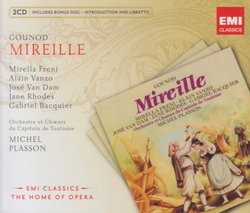Finally it is Back
Aceto | Meilhan Sur Garonne | 03/14/2010
(5 out of 5 stars)
"I was looking for the best recording of this Gounod opera, not much performed. In such matters, I find that the counsel of Olivier Comte both critical and crucial. This is the best recorded version, as I thought. But Olivier's verdict usually comes at a cost. In this case, upwards of one hundred bucks, used. Michel Plasson and Choeurs st Orchestre du Capitole de Toulouse has been one of the best in the world when operating in this arena. This opera is small and beautiful.
I waited until I could pick up a copy in France for much less at the grocery store. But I am here to tell you that EMI has finally taken notice of the used market price and re-issued it for a song, as it were. You can tell the re-issue because the cover sports an inset of the original cover. This kind of stuff used to matter in the days of vinyl reissue, which could be much worse, or today, usually much better. But with CDs there should be no difference except for insane collectors with a fetish for original art.
Tire du poeme Provencal de Frederic Mistral. That cannot be his real name, but he was obviously from the Sud. He wrote the poem in the great tradition of the L'oc in 1859. Gounod had it with the facing page French translation. Toulouse had, and I guess still has, the oldest poetry competition in the world, but not in French. The poets work only in Occitan. Anyway, Gounod fled Paris to see Mistral in Arles; and then to Mistral's home in Saint-Remy to work on the music for a few months. Carre's libretto in French was used so that Gonoud would not be assassinated in Paris.
I am kidding about Mistral's name. But it is an odd synchronicity that the divine wind of poetic inspiration blew a pastoral epic through him. He studied law, so that wind may have just been the legal blowhard in him. But you will enjoy the poem aside from the opera. You can get the English-Occitan version. It is a long poem. Mistral won the Nobel Prize. L'oc is an older, Latinate language rather than the Northern bully with Germanic roots that came to supremacy with Napoleon, who spoke Corsican, to confound the already compounded infraction.
Gounod's music is rustic with the edge softened, and sublime. For a Parisian to capture the feeling and fabric of the south in this way is remarkable. His influence on Bizet must have been both profound and unappreciated. Plasson finally makes French opera sound French. The cast is fine, with Jose Van Dam, a frequent figure in the Toulouse. Mireille herself is Mirella Freni. Close enough, no? Well, yes as far as her singing goes. Oddly, in Occitan, unique among the Latin derivatives, the female gender takes endings in "O". So, Mireio in Occitan.
I think the reason this opera is so little performed is because it has not the usual heavy dramatic rising action. It is really a staging of this sweet poem. You are lost in the swirl of the overture and transported to the mulberry grove where the female chorus of leaf pickers gather them for the silk worms. What a fine chorus has the Orchestre du Capitole has. Gounod must have soaked everything in during has stay. He gives us a good old southern farandole. The roots go so deeply that we begin to see vestiges of the pre-Christian landscape where goddesses lurk behind their reconfiguration as the Sainted Maries. The white contralto witch Taven (Jane Rhodes) sees what is to come for these young women sans souci. This is opera to inhale in open country, a bit of the Magic Flute, and has little of the formulae that makes for box office hits."


 Track Listings (16) - Disc #1
Track Listings (16) - Disc #1